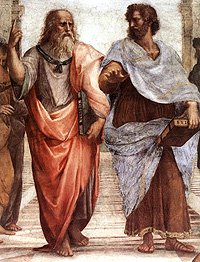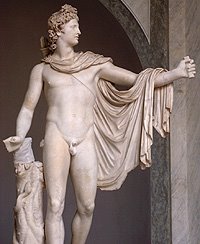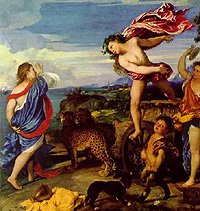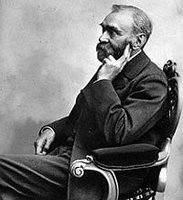Dear Reader,
You are in luck. The first principle is the easiest, because you find its title confusing. That means you will question your assumptions about it. The others will be harder because you will be tempted by the titles to believe you already know what they mean, and you will be wrong about that.
We would identify ourselves as a logos culture. A logos culture distances itself from the immediacy of life, trusting rather to theories, principles, mathematics, and overt, conscious, analyzed information than to the naive, immediate, felt experience of being immersed in the details of life. That is, a logos culture trusts the conscious mind over the unconscious, trusts logic over feelings, intellect over intuition, the mind over the heart. Taken to extremes, nothing is to be respected as inherently authoritative; everything is required to justify itself; only things that pass our tests of the intellect are permitted to be considered true or valuable. That is, a logos culture trusts only reason, nothing else. Outside of the framework of rationality and the meaning we assign to things, we believe the cosmos is ultimately inherently meaningless, and hence, for our use and disposal as we see fit.
Although logos cultures pride ourselves on our objectivity and reason, like all cultures we have our irrational, subjective sides; we just do not
identify ourselves with our irrational sides, pretend that side of us is not part of ourselves. This results in a certain ahistoricality, since the contempt of logos cultures for non-logos cultures is so intense that we cannot bear to identify ourselves with them in any way. Logos cultures insist on treating non-logos cultures as primitive versions of ourselves, unenlightened, pre-renaissance, lacking the preeminent value of all values to a logos culture - objective reason. We organize these two kinds of culture into a nominalist history of rational progress with ourselves - what a coincidence - as the advanced form. This polarization leads to an inability by logos cultures to explain our own origins, since we magnify the distance between ourselves and non-logos cultures to create a safe, impenetrable chasm, to assure ourselves there's nothing irrational left in us. In our mania for purging ourselves of the irrational, logos cultures create the ideal breeding grounds for two sets of delusions: 1) to overlook our own irrationalisms, since we hold them in such contempt, and 2) to overlook the wisdom of non-logos cultures, since we hold them too in such contempt.
The result is that the great blind spot of logos cultures is ourselves - our own origins, our unconscious natures, our wholes, and therefore the essence of what we really are. By the time logos cultures become logos cultures, we have lost the ability to explain honestly to ourselves where we came from, and as we will see, non-logos cultures cannot speak the language of logos cultures and so are equally unable to enlighten logos cultures as to our origins or ultimate nature.
But how do non-logos cultures see themselves? Do they imagine they are primitive, irrational, dangerous versions of us? Our culture prefers not to examine this question closely, to at most propose that non-logos cultures are so caught up in irrational systems of superstition that they cannot see the world clearly, let alone themselves or us. The idea that there might be an alternative form of logic about which cultures can be organized is threatening to our totalitarianizing culture, so we look away, distance ourselves as is our logos-cultural reflex with all things too intrinsically meaningful to submit to the rule of objective reason.
The alternative to logos cultures are mythos cultures, which dominate the history of the human species until recently. Mythos cultures are saturated with values, principles, feelings, stories, intuition, the unconscious, the soul, the mysterious, the divine. Where logos culture sees an objective, meaningless world to be ruled by the awesome power of human reason, mythos culture sees human reason at the mercy of a vast, powerful world ruled by powers beyond our comprehension and saturated with meaning. As Hans Jonas argues in
The Phenomenon of Life, until recently the idea that the cosmos is largely lifeless and that life is extremely unusual - the commonsense belief of our logos culture - would be inconceivable in a mythos culture. Imagine a world without roads, parking lots, cities, dust bowls, massive garbage dumps, strip malls, strip mines, clear cuts, and so on; think about those stories of salmon runs so thick you could walk across their backs, herds of bison that stretched from horizon to horizon, flocks of birds so vast they covered the skies; imagine life pressing in on you from all sides - that is what the world used to be like. In such a world, life is the norm - lifelessness the exception - and for the longest time in human history the obvious conclusion is that there were no exceptions, that everything is alive, everything is conscious, everything is divine. As the early Greek philosopher Thales of Miletus wrote,
All things are full of gods.Mythos culture is a form of paleopsychology, synthesizing millennia of painfully accumulated folk wisdom and aiming to explain the opportunities and liabilities of human mind and culture in terms every member of that culture can understand, in stories. Every god in the Greek pantheon is a power that has authority over people - lust, greed, death, war, wisdom, envy, love, and so on - and the intersection of gods and men in those stories describe the relationships among those powers in our lives. As Moderns, we read the stories as either light entertainment or as opportunities to poke fun at what we perceive to be weaknesses in their explanation of the material world we have mapped so carefully, but we skim past the morals and object lessons. As a classic example, we think Oedipus is about some freak who slept with his mother, when instead it is the definitive treatment of how hubris can take even the most apparently blessed of people and transform him inexorably into the most cursed. We think the Iliad is the story of brave Achilles, or wily Odysseus, or powerful Agamemnon, when it is truly the story of doomed Hector who knows he is going to lose everything he ever loved and must nevertheless lead his people into the most glorious loss possible to teach the future about virtue because that is all that is left to salvage; and also it is about the squandering of an entire generation of the best and brightest Greeks and Trojans left dead on the plains of Troy over what was ultimately a domestic dispute. There are grim and vital lessons for humanity in the mythos culture of the archaic Greeks, not by coincidence but by design - this is what mythos culture is better at than logos culture.
In a logos culture, we teach history sliced into discrete facts and assemble them to achieve some kind of power over the world by predicting the future based on the past; logos culture prides itself on inventing history. In mythos culture, they taught history in terms of stories, geneologies, cosmologies - wholes impregnated with life lessons to create a population of people with shared values. Logos culture drives toward a system of laws, not men; mythos culture a system of men, not laws. So it is with every other field of study. Logos culture uses systems of dissection - analysis - to divide the cosmos's web of logic into abstract formulas each of which describes a tiny fragment of the cosmos which can then be controlled according to that formula, driving toward a view of the cosmos as an elaborate machine composed of manipulable parts. Mythos culture uses systems of composition - synthesis - to assemble the fragments of our understanding of the cosmos into a web of meaningful stories that describes that culture's lessons about Man's place in the cosmos. Logos culture uses abstraction, distance to acquire power; mythos culture uses intuition, immediacy to share meaning. The drive of logos culture is to put Nature in harmony with Man under Man's authority; the drive of mythos culture is to put Man in harmony with Nature under Nature's authority.
Where logos culture trusts the conscious mind, mythos culture trusts the unconscious. Where logos culture emphasizes the abstract and universal, mythos culture emphasizes the concrete and particular. Where logos culture is left-brained, mythos culture is right-brained. Where logos culture is Apollonian, mythos culture is Dionysian (no, not in the drunken, party animal sense, but in the embrace of the rest of ourselves beyond the rational mind, the embrace of mystery). Mythos culture is weak on analysis, on questioning assumptions, on disrupting moribund cultural structures, but logos culture is weak on synthesis, on promoting shared beliefs and values, on preserving and strengthening healthy cultural structures. Mythos culture is a nest, logos culture a knife. Neither is sufficient in the long run, which brings us back to the ancient Greeks.
In ancient Greek mythology are all the seeds of ancient Greek philosophy, and when the Greeks began writing theirs was thoroughly a mythos culture. The Greeks began their transformation as a collection of tribes with a common language and military culture of excellence but with diverse religious and political practices. A series of crises and opportunities drove the Greeks to unite as a people, forcing them to analyze their separate religious and tribal practices and deliberately, consciously weld them together into a single, shared culture, essentially crafting their new religion and laws by hand to accomplish this. Although they largely succeeded, the effort so transformed them as a people that they were driven into that explosive cultural revolution that transforms a mythos culture into a logos culture, but unlike almost any other culture in the history of the world, they wrote their way through the whole thing, essentially documenting the stages of thought and culture along the way from one side to the other, leaving us with all the evidence we need to understand the strengths and weaknesses of both types of culture.
Early in this transformation, their mythos culture began taking on logos characteristics as they began philosophizing about their culture, resulting in a remarkably self-aware mythos culture. Later, as they shifted into a logos culture they brought the mythos culture's emphasis on principles and values into their notions of objectivity and reason, resulting in a remarkably principled logos culture. In the end, they passed so far into logos culture that a nihilistic movement known as the sophists arose, arguing that nothing mattered but manipulating others to advance one's own self-interest. Greek culture dissolved into such a nihilism that later-stage Greek culture began to resemble our own, at which point Greek civilization collapsed into a series of devastating civil wars ended by conquest first by Macedonia and later by the Roman empire. The ancient Greeks rocketed through this entire arc of transformation in high gear, passing from mythos culture to logos culture to complete collapse in just a few centuries, analyzing themselves and documenting what they saw as they went.
There are three reasons why this principle of reading the ancient Greek philosophers in terms of their transition from mythos to logos culture is so crucial:
First, each ancient Greek philosopher wrote at some specific point along this arc of transformation, and many of them influenced the course of their culture's development by what they wrote. To understand any given philosopher of the ancient Greeks, we must understand when they wrote, what they would have so taken for granted as not to bother saying explicitly, what within that culture they were criticizing and why, and how and why their successors reacted to them as they did. Without understanding these things about each ancient Greek philosopher, we are guaranteed to misunderstand their intent. For example, although later logos philosophers are often as literal as we might be writing today and often focusing on dividing the cosmos up into analytical pieces, earlier mythos philosophers are often writing metaphorically, allusively, focusing on relating the cosmic forces with one another in order to understand the overall pattern. Where later philosophers are alarmed by their culture's decay into sophistry and arguing against nihilism, earlier philosophers are often criticizing mythographers for being overly rigid and credulous about their articles of faith.
We cannot understand Xenophanes unless we understand how early he came in this cycle, so we know he is writing so much about the gods because his culture is so steeped in religion that he has to grapple with that subject in detail if he is to move his culture ahead on any subject; from this perspective, we begin to appreciate his efforts to create the concept of philosophical inquiry, as well as his insistence on treating the cosmos as an integrated organism rather than just a space or a collection of things. We cannot grasp Thales when he writes everything is water unless we know he was the first to argue that there is a common material basis for all things (which is true and will later develop into Democritus's atomism), and that furthermore all things that appear stable actually flow (which is also true and will later develop into Heraclitus's dialectical materialism). His insights were revolutionary and necessary for everything that came later, but a modern, literalistic reading (how stupid - not everything is H2O! - what nonsense) misreads both his intent and his significance. So it is with each of the great Greek philosophers.
Second, beyond this principle's necessity for us to begin to comprehend any of these philosophers, we need to understand it in order to know what kind of perspective is being assumed relative to our own logos culture, whether we are looking at a mirror or criticism of our own type of culture, or of the mythos type, and to consider what that means for our own culture accordingly. This is a powerful source of insight if we use it correctly.
Third, this principle is the core explanation for why some of these thinkers were able to anticipate what we think of as purely modern thinking by over two thousand years. Without the benefit of modern technology, Democritus reasoned out the atomic basis of all matter. The scientists of the European renaissance all openly acknowledged their complete indebtedness to the Greek thinkers before them. The Greeks formalized the principles of democracy likewise. The invention of the alphabet, hyper-realistic art, the invention of philosophy along with the definition of all major subjects and boldest statements of all the alternative positions on each of those subjects - no matter where we look, we find the Greeks ahead of us in breadth and depth of innovation; we depend upon and build upon their much earlier work in the same areas. They could not have done these things had they remained a mythos culture - they would have lacked the systematic rigor and emphasis on an objective posture - but neither could they had they been merely a logos culture as we are - they would have lacked the rich foundation of values and principles, cultural assumptions that drove them to an excellence they took for granted, assumed as their debt to their divine ancestors, achievements of personal excellence and accomplishment that they needed as their only shot at immortality because of their beliefs about the afterlife. The ways in which their mythos culture enriched and even made possible their logos culture should teach us something fatally important about the limitations of logos culture alone, about our form of culture.
Philosophy was only made possible for them when the logos-impulse to shape themselves rationally as a people intersected with millennia of accumulated mythos-folk wisdom about the meaning of Man and Nature and the Divine. When their logos-rocket kicked in, their slow mythos liftoff had already done half the work for it, including build the rocket. The Greeks offer us a hint of what is possible if our systems of inquiry are grounded not in value neutrality but in complete dedication to principles and to the cultivation of greatness rather than mere satisfaction of appetites or pursuit of personal power, that is, to a marriage of both kinds of culture.
Yours truly,
Rick












